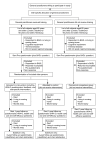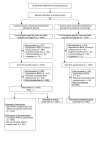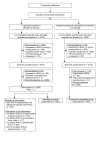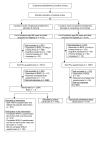The PRO-AGE study: an international randomised controlled study of health risk appraisal for older persons based in general practice
- PMID: 17217546
- PMCID: PMC1783855
- DOI: 10.1186/1471-2288-7-2
The PRO-AGE study: an international randomised controlled study of health risk appraisal for older persons based in general practice
Abstract
Background: This paper describes the study protocol, the recruitment, and base-line data for evaluating the success of randomisation of the PRO-AGE (PRevention in Older people-Assessment in GEneralists' practices) project.
Methods/design: A group of general practitioners (GPs) in London (U.K.), Hamburg (Germany) and Solothurn (Switzerland) were trained in risk identification, health promotion, and prevention in older people. Their non-disabled older patients were invited to participate in a randomised controlled study. Participants allocated to the intervention group were offered the Health Risk Appraisal for Older Persons (HRA-O) instrument with a site-specific method for reinforcement (London: physician reminders in electronic medical record; Hamburg: one group session or two preventive home visits; Solothurn: six-monthly preventive home visits over a two-year period). Participants allocated to the control group received usual care. At each site, an additional group of GPs did not receive the training, and their eligible patients were invited to participate in a concurrent comparison group. Primary outcomes are self-reported health behaviour and preventative care use at one-year follow-up. In Solothurn, an additional follow-up was conducted at two years. The number of older persons agreeing to participate (% of eligible persons) in the randomised controlled study was 2503 (66.0%) in London, 2580 (53.6%) in Hamburg, and 2284 (67.5%) in Solothurn. Base-line findings confirm that randomisation of participants was successful, with comparable characteristics between intervention and control groups. The number of persons (% of eligible) enrolled in the concurrent comparison group was 636 (48.8%) in London, 746 (35.7%) in Hamburg, and 1171 (63.0%) in Solothurn.
Discussion: PRO-AGE is the first large-scale randomised controlled trial of health risk appraisal for older people in Europe. Its results will inform about the effects of implementing HRA-O with different methods of reinforcement.
Figures




References
-
- Robbins L, Hall J. How to practice prospective medicine. Methodist Hospital of Indiana, Indianapolis, IN; 1990.
-
- Rand Corporation . Health Risk Appraisals and Medicare. Evidence report and evidence-based recommendations. US Department of Health and Human Services. Baltimore MD; 2000. http://www.rand.org/cgi-bin/health/showab.cgi?key=2003_406&year=2003
-
- Shekelle PG, Morton SC, Keeler EB. (Prepared by the Southern California Evidence-based Practice Center under Contract No 290-02-0003) AHRQ Publication No 06-E006. Rockville, MD: Agency for Healthcare Research and Quality; 2006. Costs and benefits of health information technology, evidence report/technology assessment No. 132. - PMC - PubMed
-
- Breslow L, Beck JC, Morgenstern H, Fielding JE, Moore AA, Carmel M, Higa J. Development of a health risk appraisal for the elderly (HRA-E) Am J Health Promot. 1997;11:337–343. - PubMed
Publication types
MeSH terms
LinkOut - more resources
Full Text Sources
Molecular Biology Databases

